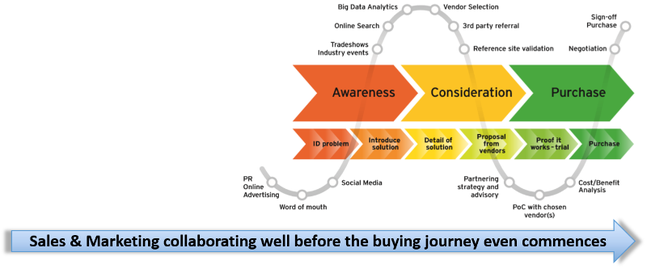Sales & Marketing alignment is now absolutely fundamental to success in 2017 and beyond.
Everyone is hearing more and more that times are changing rapidly for sales people, and there is no doubt that this is true. Vendors no longer have the power, and the role of the B2B sales person continues to evolve rapidly as buyers change how they buy. Forrester recently predicted that circa 25% of all B2B sales roles will disappear by 2020, and even if Forrester is only half accurate, intuition tells me that sales people are in for an increasingly difficult time in the coming years.
Having now spent 27 years in sales roles, I have developed a typically large network of friends and associates whom are currently working in B2B sales roles (mostly in high tech), and NONE of them are having a great time right now. Market maturity, commodification of products, evolving technology enablers and the associated changes in buyer behaviour are all having a large impact on practically every sales department, in every industry – globally. Sales conversion rates are declining, margins are eroding, and sales staff attrition rates are increasing as the total cost of sales continues to climb. These are fairly serious problems if you ask me.
So, what should we do?
Well, lets start with what NOT to do: The typical knee-jerk reaction from business leaders to any of the above scenarios is to quickly default to some sort of sales training (that is after they have fired their low performing sales people) in the belief that their sales team is somehow lacking in the requisite skills to be successful. Not a complete waste of time, but almost. In short, blanket sales training, regardless of individual skills and experience is not the way to go. CEB Research recently found that less than 5% retention occurs from sales training unless these skills have been applied in the field. If training is not relevant to the individuals or customised to their level, if it was not applicable to their current needs, then sales people will not be able to apply what they learnt on return to their territory. If you must throw money at the "under-performing" sales team then hire a professional coach to work with them over an extended period.
What SHOULD we do instead?

Sales now needs their marketing colleagues to assist in creating highly targeted campaigns that build ‘buying stage appropriate’ messages, and that engage stakeholders around key trigger events throughout the new buying journey…..bearing in mind that a whopping 66% of buyers reported “I heard of them before we started the buying process” as the #1 reason why they selected a particular vendor for their project (Buyersphere, 2015).
There is no doubt that the effective sales teams of the future will collaborate very closely with their marketing counterparts to create that critical ‘awareness’ through: compelling value-added content, communities, conversations and thought leadership that actually adds value well before a customer is ever aware that they need to buy something. These effective sales-marketing teams will also find ways to position their own sales-marketing leaders as highly credible industry subject matter experts with the type of domain insights that allow them to attain trusted advisor status with their clients.
Part of the reason why sales people don’t currently work more closely with Marketing is because they don’t understand the new marketing world. With digital channels, we have shifted from traditional sales and marketing vehicles to a more social and viral approach. The use of Big Data, predictive analytics, social media, blogs and various forms of social ‘listening’ are fast becoming standard tools in the armoury of vendors for not just creating ‘awareness’ and more targeted selling, but also for ensuring that vendors know exactly what customers (and competitors) are saying about them. One of the most powerful ways of using social media is to get customers to recommend products to one another, and this will help create vendor ‘mind-share’ prior to the customer becoming aware of a problem. Building strong customer relationships, turning customers into advocates and working with a sense of urgency and pace to manage bad experiences will also help build trust and help avert disaster when times are tough. Of course, relying on tools (as powerful as some can be), will never replace the people and process elements of effective sales execution. Technology won’t be enough without a cohesive team of sales and marketing people.
When sales leaders fail to grasp the importance of true sales-marketing alignment they will face a very difficult future competing with vendors that get this right. My advice is to forget the sales training (for now)…there are more important priorities. Get your sales and marketing teams together around some clear and common objectives…measure them and make them accountable as one team. Do this effectively, and watch your sales pipeline grow with quality opportunities.

